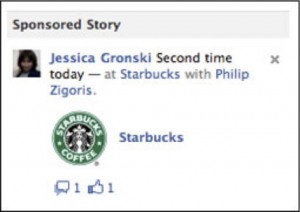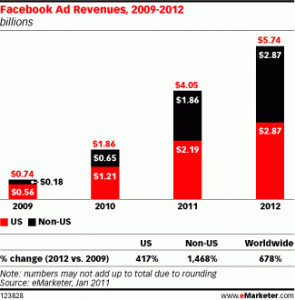 So, you went Starbucks? And you posted it in Facebook, like many other activities you do? Well then, your friends may not only see the typical entry in the news feed, they may also see a “sponsored” story in the right-hand side of the page, with the Starbucks logo included. And better yet (for Starbucks) the sponsored story will not scroll down as the news feed progresses; it will stay there for the duration of your session.
So, you went Starbucks? And you posted it in Facebook, like many other activities you do? Well then, your friends may not only see the typical entry in the news feed, they may also see a “sponsored” story in the right-hand side of the page, with the Starbucks logo included. And better yet (for Starbucks) the sponsored story will not scroll down as the news feed progresses; it will stay there for the duration of your session.
And if your friends “like” it and click the thumbs up icon, all their respective friends will also see that they like your trip to Starbucks!
On January 2011, Facebook launched the “Sponsored Stories” marketing tool (see promotional video of the app) with the intention to monetize the many entries users make in Facebook containing brand names. The reasoning behind the move is simple: (1) many users like to say that they went to a given restaurant: “with Brenda and the kids to McDonald’s” or “just bought my new 64Gb iPad” are typical entries, (2) these entries may or may not appear in your friends news feed, as Facebook data is that only 0.2% of the “what’s in your mind” box make it to your fiends news feed, and event if it shows up, chances are that when you login or look at the screen the item is far gone down the pile, and (3) there is ample evidence that friends recommendations have a far greater impact on purchasing decisions than traditional advertising. With these premises, it only makes sense that Facebook offers companies the possibility of leveraging an individual’s endorsement of a brand to push it to their friends.

Moves like this are essential if Facebook has to keep up with the expected growth in advertising revenues that is behind the astonishing valuations being considered. Although questions about privacy may not be relevant, as only your friends will see your whereabouts, and they could anyway, this move by Facebook do rise, in my opinion, some ethical considerations. For one, only paying companies have the right to “stay” in the page without being scrolled down by the activity of my friends. If I go to Starbucks and write an innocuous comment like the one in the insert, but in the afternoon I go to Costa Coffee and write that I liked it a thousand times more than my morning coffee at Starbucks, this last comment may or may not appear, depending on the algorithm Facebook uses to select what appears and what does not in the news feed. Let us hope that this algorithm is not altered by the fact that one company does pay and the other does not, but in any case, the persistence of the second item on the screen of my friends will be a function of the activity of my network and might be quite short.
There is another side to the story as well. Facebook claims that it will not modify in any way the content of the user’s message when creating the sponsored story, it will only look for the brand’s citation and create the ad. What happens if the content of the message is negative? Wouldn’t in that case the company be paying for bad publicity of its own brand?
The next few months will unveil which companies, and in what quantities, will sign for the sponsored stories program and we will be able to see whether users like it or not. Facebook is used to experimenting and removing features if the community dislikes them. Zuckenberg has had to apologize a couple of times to the users (the Mini-Feed privacy fiasco being the most notorious) without having had much effect on its growth, so maybe even if they mess this one up nothing will happen either …



Almost similar to pretty much any major websites such as Google, and Youtube, these sponsored feature is really helping tons of businesses improve their marketing efforts. I’d say it’s a pretty good addition to have and being pretty much the second most visit website in the world, it’s an important aspect to have.
Cheers for the details my friend.
– Ali T
It’s an interesting development. From what I understand, FB Sponsored Stories is being driven off the organic content of check-ins by users of FB Places. I think the challenge for FB is that only a fraction of FB users have a smart phone, and only a fraction of those users will try FB Places, and only a fraction of those users will *habitually* use FB Places. This tiny subset of users will determine how much organic content there is to monetize, although with 500M+ users tiny is a relative word.
I really think Facebook will take over Google. They are more clever and I think 2011 and 2012 will be a cruel fight between them.
Steve more and more people are starting to go online threw mobiles. I just made a search for my grandfather for a simple mobile phone and didn’t manage to get one with big digits and no camera or wi-fi connection. Soon when you will want to buy a mobile they will have only smart phones.
Great post 🙂
It’s an interesting development. From what I understand, FB Sponsored Stories is being driven off the organic content of check-ins by users of FB Places. I think the challenge for FB is that only a fraction of FB users have a smart phone, and only a fraction of those users will try FB Places, and only a fraction of those users will *habitually* use FB Places. This tiny subset of users will determine how much organic content there is to monetize, although with 500M+ users tiny is a relative word.
Another key issue is privacy since it is dealing with each individual’s location and consumption preferences. If FB slip up [again] then it will deter users, and despite improvements the FB privacy settings are still complex for the average user. What will be significant is whether the Sponsored Story is displayed to the user’s friends list, or to only those friends whom the user has authorized to see the underlying FB Places check-in event.
Regards,
Steve